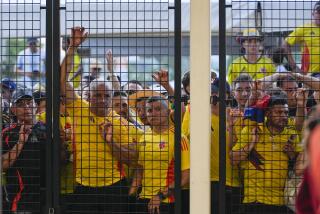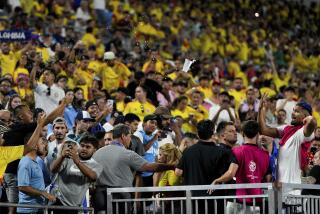WORLD CUP USA ’94 : ANALYSIS : Something Never Seemed Right : Conspiracy: Colombia’s play didn’t come anywhere near expectations. What happened?
- Share via
CHICAGO — The conspiracy theories abound and grow in strength from day to day. There is little that can be done to stop them.
They begin as nagging questions in the minds of international soccer writers who have covered the sport for decades. They quickly grow into serious doubts.
And when those doubts about the legitimacy of a team’s commitment are reinforced by that team’s poor performance, a flag is raised in the writers’ minds.
Something is amiss. Is the game being decided on the field or elsewhere?
Throw in a death threat that completely undermines that same team’s morale on the day of a crucial game and the suspicions become more real.
And when the team in question is beaten by an opponent all logic says it should overwhelm, those suspicions turn into theories.
The theory being flashed around the world by some writers covering the 1994 World Cup is that Colombia never had a chance to win this tournament.
The murder of defender Andres Escobar outside a Medellin restaurant on Saturday has only confirmed the suspicions of many that the Colombian national team was merely a puppet being controlled by the drug barons back home.
The fix was in from the start, the theorists claim, and the outcome of Colombia’s games against Romania, the United States and Switzerland had less to do with what the players did on the field than with what the drug cartels that run and ruin Colombian society did off it.
The fact that Escobar scored an own goal that helped the United States defeat Colombia at the Rose Bowl is viewed by some as the reason for his murder. But this apparently was not a casual act of violence, not merely another random shooting in a country that is controlled by the gun.
Several bullets is the sign of serious intent. To the conspiracy theorists, the shooting was not the result of an argument over the own goal, as has been suggested, but rather a deliberate act to silence Escobar for what he might have known.
The theory is that the drug cartels stood to lose vast amounts of money if Colombia won the World Cup. They had bet against their own country, the theorists say, and when it became clear that Colombia indeed did have a chance to win the tournament, they stepped in.
Were it any nation but Colombia, such theories would be laughed at, but Colombian soccer has been controlled by the cartels for years. The murder of referees and threats against players are nothing new.
And then there is the trail of tragedy that has followed Colombia since it qualified for World Cup ’94 last year with that astonishing 5-0 victory over Argentina in Buenos Aires.
Two players, Freddy Rincon and Luis Herrera, both lost brothers in traffic accidents. Those “accidents” surely must now be looked at in a different light in wake of Escobar’s murder.
Then there was the death threat against midfielder Gabriel Gomez’s family that was sent by facsimile to the Colombian team’s headquarters in Fullerton on the eve of the game against the United States.
And now the murder in Medellin. Was Escobar instructed to put the ball in his own net if he got a chance? Were some or all of the Colombian players purposely throwing the game in order to save their lives or the lives of their families? Was the United States’ greatest victory scored against a team that never was going to win the game anyway?
Such questions are being asked, but they are the type of questions that will never be answered. The theories will continue, but the only substantive information that can be obtained is to look at the Colombian team itself and ask whether it really had a chance.
If you discount the conspiracy theories completely, then one question remains: Why did Colombia fail when it was expected to do so well?
Was it nerves? Unlikely. The 5-0 drubbing of Argentina was achieved in the caldron of Buenos Aires, for example, not at home in Bogota. The Colombian team had experienced World Cup players from 1990 in its squad. The team had taken part in the 1993 Copa America tournament in Ecuador and had done well.
No, it could not have been nerves. These were players who were tried and tested.
Was it ability? Were the Colombians overrated as players? Were they simply outmatched when they came up against World Cup caliber opposition?
Again, this is unlikely. Midfielder Carlos Valderrama is a two-time South American player of the year for good reason. He is one of the best in the world at his position. Forwards Faustino Asprilla and Adolfo Valencia play on championship-winning teams in Europe--Asprilla for Parma in Italy and Valencia for Bayern Munich in Germany. They are considered world-class players.
The same is true for others on the team, including Rincon, so the idea that the Colombians did not match up on the field is ludicrous, especially against the Romanians, Americans and Swiss. These weren’t the Germans or Brazilians they were facing. They should have won easily.
So if it was not nerves and it was not lack of ability, what could have led to Colombia’s downfall?
It appears more and more likely that there were forces at work beyond the control of Coach Francisco Maturana. Threats against players and their families were made and had the desired effect of undermining confidence. Of that there is no doubt.
Soccer is a team sport that relies on the ability of 11 individuals to become one on the field, to function as a unit, to think and react in unison. It takes only two or three players to be distracted or to play badly, purposely or otherwise, to ruin any game plan.
And Colombia certainly had players who did not play well. Goalkeeper Oscar Cordoba was a disaster. His positioning was bad and attempted saves were feeble efforts. But he had not played that way before. In fact, he had been praised for the confidence of his approach and the sureness of his handling. He was the team’s first-choice goalkeeper.
And Asprilla, who was supposed to be the next big world star, almost disappeared. He had little or no influence on Colombia’s attack at a time when he should have been leading it.
As for Valderrama, his play never reached the heights of which he is capable. But the same could be said of all the Colombian players.
It is possible that the opening game loss to Romania shattered the team’s morale and self-belief. But there was nothing to suggest the Colombians’ confidence was that fragile.
No, there was something more at play here, something uglier and more devious. Something evil.
But that’s only a theory.
More to Read
Go beyond the scoreboard
Get the latest on L.A.'s teams in the daily Sports Report newsletter.
You may occasionally receive promotional content from the Los Angeles Times.






